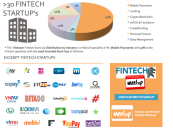Fintech has further risen in 2016, a year marked by an increase in governments’ support and interest in the field.
The regulatory sandbox approach has taken hold in Asia-Pacific. In the third quarter of 2016, Hong Kong launched a regulatory sandbox for financial technology innovation in the banking sector, following on the heels of Australia and Singapore. Indonesia, Malaysia and Thailand are also moving in this direction.
In Asia, a number of fintech areas are gaining more attention from VC investors, in part, because of their potential to traverse different markets. These sectors include payments, mobile, data and analytics and regtech.
2017 has arrived and today, we take a look at what’s to expect in the new year ahead.
Improving the customer journey
As customers expect simpler and more seamless digital experience, banks need to re-imagine their core journeys from front to back by addressing key customer pain points and identifying new opportunities to provide a better customer experience.
One of the focuses for 2017 will be to enhance the customer experience through proactive customer experience design and provide more personalized financial services, including mortgage, savings deposits and checking accounts.
A research study conducted by the Financial Brand found that a majority of traditional financial services organizations are providing relatively poor performances in terms of delivering a customer-focused digital account opening, onboarding and cross-selling process. This is an opportunity for institutions that want to embrace the potential of becoming a digital bank.
“In 2017, limited resources and cultures of ‘legacy thinking’ will cause the gap to widen between customer expectations and digital customer experience at many smaller institutions (under US$1B in assets),” said Jim Perry, consultant and strategist at Market Insights.
“Thankfully, the year ahead will also see new resources emerge – as well as new examples of organizational agility and operational structuring – that will finally prompt some small institutions to reshape cultures and become digitally proficient and customer-centric.”
Big data, artificial intelligence and advanced analytics
Data will be the foundation for many of the trends and predictions in 2017. Consumers have indicated their willingness to share information about themselves, and banks have been collecting data. Yet, the majority of organizations are not doing anything with it that benefits the customer such as delivering individualized engagement, and personalized services and financial advice.
The promises and hype around big data, advanced analytics and AI have yet to be realized for many institutions. “2017 will herald in the fifth age of banking – the analytics age,” said Don MacDonald, CMO at MX.
“Financial Institutions will face an unprecedented opportunity to be true advocates for consumers by utilizing data to the same level as other disrupted industries (think Amazon or Netflix). Consumers enjoy unprecedented choice and virtually no friction to change. FI’s who do not embrace data will find themselves beautifully equipped for a world that no longer exists.”
Open APIs
Open banking, an emerging term in fintech, refers to the use of open APIs that enables third party developers to build applications and services around the financial institution. It implies greater financial transparency options for account holders ranging from open data to private data.
The use of open APIs provides the opportunity for combinations of products and services beyond traditional banking. It also enables incumbent banks to build and launch products more quickly, and probably more easily, than they historically could.
Moreover, banks will likely find it attractive that open APIs require minimal connection effort on their part while offering access to multiple third parties. Fintechs, on the other hand, will benefit by gaining access to incumbent institutions’ large customer bases.
“2017 will be the year of open marketplaces and platforms,” said Chris Skinner, author and CEO of The Finanser Ltd.
“Platforms support the rapid cycle deployment of microservices into a financial marketplace. Those microservices are apps, APIs and analytics that transform the back, middle and front office respectively. As the financial world is rapidly moving to open, loosely coupled marketplaces, any bank with old legacy technology will start to look like a dinosaur.”
More bank/fintech collaborations
Sebastien Meunier, senior manager at Cappuis Halder & Co., predicts that “2017 will be the year of ‘convergence’ in financial services.”
“There will be more cooperation between financial services and startups, blurring lines between traditional products (retail, payments & insurance in particular), and the acceleration of the convergence of technologies including mobile, distributed ledgers, IoT and cognitive computing,” Meunier said.
While fintech ventures have the first mover advantage, delivering customer-centric solutions at a low cost, they still lack scale in most cases. This is mainly because traditional financial institutions continue to be viewed positively by consumers in some of the most important foundational areas such as trust.
However, the increasing unmet consumer demands for digital banking solutions means that there is a great opportunity for fintech startups and banks to collaborate and leverage each other’s strengths.
The rise of Regtech
Regtech, which focuses on helping financial institutions manage their regulatory obligations more efficiently and cost-effectively, has gained attention, particularly in jurisdictions with more mature fintech ecosystems, such as Singapore, Australia and Hong Kong.
According to Henri Arslanian, fintech and regtech lead for China/HK at PwC:
“Many regtech solutions are now becoming available to help banks reduce compliance costs. Unlike fintech, where there is an element of competition between banks, regtech is an area where everyone could win by cooperating.”
IBM’s acquisition of regulatory compliance consulting firm Promontory is a good example of the opportunities in the space. Former regulators have been training IBM’s artificial intelligence platform, Watson, about compliance.
A recent report by Deloitte pointed out the rapidly evolving regtech space, noting that new solutions will likely emerge during 2017 for use by both regulators and regulated.
Areas that are progressing quickly include know-your-customer compliance processes, automated regulatory reporting, and communications monitoring, according to the consulting firm.
All those trends are also discussed on the upcoming Future of Digital Banking: Asia Pacific conference which will take place in Singapore on March 21 and 22, 2017. The conference will feature C-level executives at DBS Bank, Yoma Bank and Evergrowing Bank who will discuss the hottest fintech trends and innovations. Topics covered will include blockchain technology, financial inclusion, digitalization, mobile banking, among other things. Get 20% Discount on all Tickets with Code “SMK02FNS20”
Featured image by MaximP, via Shutterstock.com.









